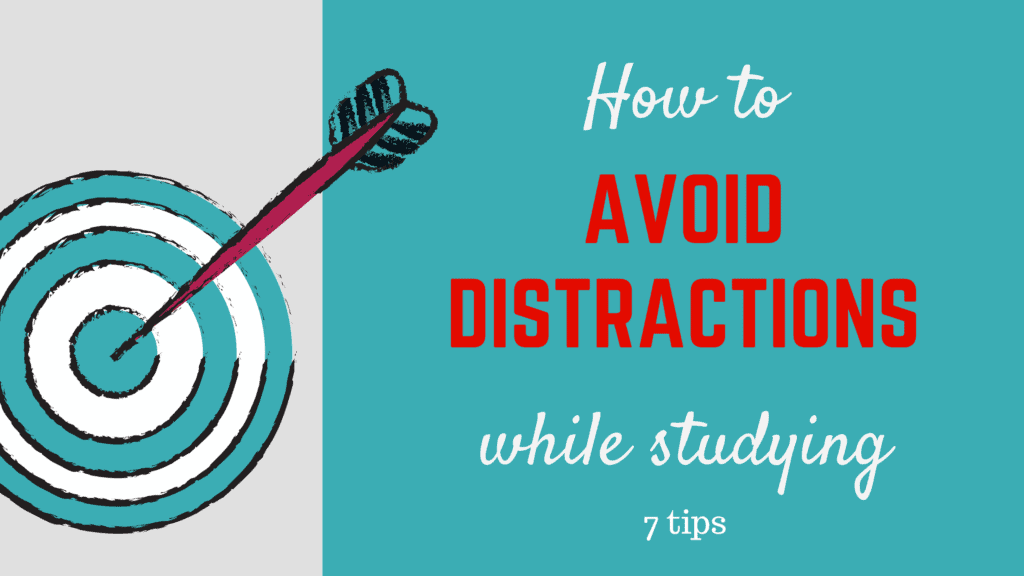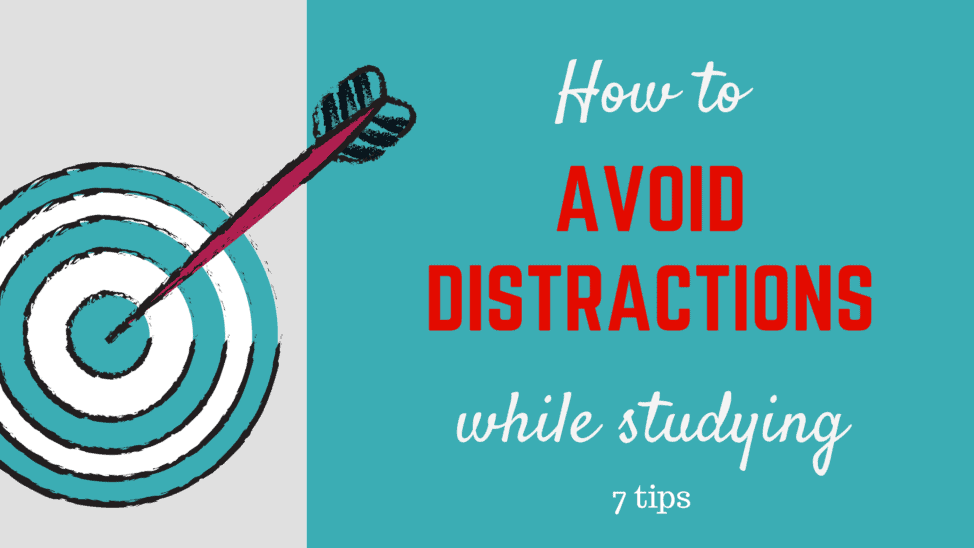
It’s funny how we can watch Netflix for 3 hours straight without blinking. But when we sit down to do something “hard,” like study, we are suddenly distracted by every little teeny tiny thing.
Many of my clients and students come to me complaining that they studied for hours or days for a test that they ended up failing anyways. But I rarely ever believe this is true. In most cases, someone claiming to study for “hours” might only be getting 30 minutes or so of quality study time — the rest of the time is spent being distracted.
Below are 7 tips for how to avoid distractions while studying. Admitting we get distracted while studying is the first step — and doing something about it is the next step. Ready? Here we go:
How to avoid distractions while studying
1. Pick the right environment.
Our surroundings impact how we feel and how we perform. Some people need absolute peace and quiet while studying, while others prefer white noise in the background. (White noise includes low conversational murmurs, too.)
Picking the right environment doesn’t mean picking the most interesting environment. It means picking a location that reduces the chances of you paying attention to what’s going on around you.
If you’re studying at home, keep your study space clear of clutter, including stacks of papers, materials for other classes, etc. The only materials you should have out are the materials you need for your study session.
It can also be a good idea to match your study environment with your learning style. If you’re a visual learner, set up your space like this. If you’re an auditory learner, set up your space like this. Or if you’re kinesthetic, try this.
2. Have a plan.
It’s a guarantee that if we don’t have a detailed plan of what we are going to study, we will end up distracted and doing something else. We become distracted when we don’t have a study plan because we have nothing to guide our focus and keep us on track. Basically, our brains start thinking Eh, I don’t know exactly what I’m supposed to do … so I’ll just go do this random thing.
Your study plan should outline – in detail – what you’re going to study and how long you will study each item. Write this information down on paper. Use a calendar. Be real with how much time you think you’ll need. Seriously, if you really want to know how to avoid distractions while studying, you need to know how to make and follow a study plan. Here’s exactly how to do that.
3. Put your phone in another room.
For real. Do this. Pick up your phone, walk to another room, and leave it in there. It is not enough to simply turn your phone upside down on your desk. If you’re studying in a public location like a cafe or a library, then put your phone inside your bag, preferably zipped away in an inside pocket that’s hard to get at.
Our phones are stimuli. This means that just the act of seeing our phones on our desks activates parts of our brains that will make it harder to focus on what we should be focusing on. An actual chemical reaction happens in our brains just when we see our phones. Freaky, but true. (Here’s the science behind this.) So yeah … put the darn phone in another room 🙂
4. Take care of basic needs.
It feels silly to elaborate on this one, because it seems obvious. But here I go anyways: don’t be hungry before you sit down to study, don’t be exhausted, and make sure you have something to drink. Avoiding distractions while studying includes avoiding trips to the bathroom too, so take care of business before you start your session.
5. Schedule breaks, and take them.
If you schedule breaks into your study session, you can reduce the likelihood that you’ll get distracted by the squirrel out the window, your weird fingernail, or the conversation behind you. Psychologically speaking, when we “see the light at the end of the tunnel” — in other words, a break — we can often find the energy to keep going until we reach that light. On the other hand, if we don’t schedule breaks, then our brains will take them for us! (Not cool.) Keep breaks to no longer than 10 minutes, or use the Pomodoro Technique.
6. Don’t ignore nagging thoughts.
A great way to avoid distractions while studying is to not avoid our nagging thoughts. Keep a piece of paper on your desk, and any time a distracting or nagging thought pops up, write it down. The simple act of writing it down takes it out of our brains and lets us “forget” it until we can address it later. If we don’t write these thoughts down, our brains will do all they can to keep that thought alive — and this is distracting. And annoying.
When you’re all done studying, look at the list and take care of anything you need to do.
7. Mix it up.
Sometimes we get distracted while studying because we are bored with some aspect of what we are doing. (And yeah, the material might be boring too, but we don’t have control over that, so that’s not what I’m talking about here.) Perhaps we are bored with our setting or our flashcards, so mix it up.
When we experience something new, a certain area in our brains becomes activated … and this area is also responsible for learning. What?! So cool. (Here’s the science, if you’re into that.)
To liven things up, and therefore become less distracted, try out a new study location (here are some wicked cool ideas), get new materials, or try out a different study technique. Do something different. When we experience something new, our brains basically light up, and we learn more. Woah.
Knowing how to avoid distractions while studying is a good first step. And now you know 7 ways for doing this. Your next task is to head over to my post called What to Do When You Just Can’t Focus for more practical tips to improve your concentration.
(And as a reminder … seriously put the phone in another room when you’re studying.)

